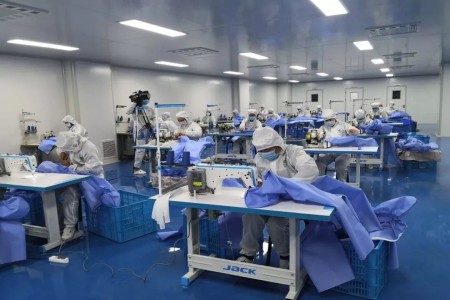2023/6/16

Surgical Mask vs KN95 Mask
The COVID-19 pandemic has made face masks a part of our daily lives. However, with so many options available, it can be confusing to figure out which one offers the best protection. Two of the most popular types of masks are the surgical mask and KN95 mask. Both offer different levels of protection against COVID-19, but which one is the best? In this article, we will compare the surgical mask and KN95 mask, breaking down the differences and similarities to give you a better understanding of which one is right for you. We’ll explore the effectiveness of each mask, their features, and the situations where each one is most appropriate. So, whether you are a healthcare worker, someone who needs to protect themselves from the virus, or just curious about the differences between these masks, read on to learn more.
What is a Surgical Mask?
A surgical mask, also known as a medical mask, is a loose-fitting mask that covers the nose and mouth. It is designed to protect the wearer’s nose and mouth from contact with droplets, splashes, and sprays that may contain germs, such as the COVID-19 virus. Surgical masks are typically made of three layers of material: an outer layer of non-woven fabric, a middle layer of melt-blown fabric, and an inner layer of soft, absorbent material. The outer and inner layers are made of spunbond material, while the middle layer is made of melt-blown fabric.
Surgical masks are not designed to filter out small particles in the air and do not provide complete protection against the COVID-19 virus. However, they can reduce the spread of the virus by reducing the amount of respiratory droplets that are released into the air when the wearer talks, coughs, or sneezes. Surgical masks are also effective in preventing the wearer from touching their nose and mouth, which can help prevent the transmission of the virus.
Surgical masks are widely used in healthcare settings, where they are used to protect healthcare workers from exposure to infectious diseases. They are also used by the general public to prevent the spread of the COVID-19 virus. Surgical masks are disposable and should be discarded after use. They should not be reused or shared.
What is a KN95 Mask?
A KN95 mask is a type of mask that is designed to filter out at least 95% of particles that are 0.3 microns or larger in size. It is similar to the N95 mask, which is used in healthcare settings to protect healthcare workers from exposure to infectious diseases. However, the KN95 mask is not approved by the FDA for use in healthcare settings.
Like the surgical mask, the KN95 mask covers the nose and mouth and is made of multiple layers of material. The outer layer is typically made of non-woven fabric, while the middle layer is made of melt-blown fabric. The inner layer is made of soft, absorbent material.
KN95 masks are designed to fit tightly to the face and create a seal around the nose and mouth. This helps to prevent the entry of airborne particles, including the COVID-19 virus. KN95 masks are also effective in preventing the wearer from touching their nose and mouth, which can help prevent the transmission of the virus.
KN95 masks are designed for single-use and should be discarded after use. They should not be reused or shared.
Differences between Surgical Masks and KN95 Masks
While both surgical masks and KN95 masks are designed to protect the wearer from the COVID-19 virus, there are some key differences between the two masks.
The first difference is in their effectiveness. Surgical masks are designed to protect the wearer from contact with droplets, splashes, and sprays that may contain germs, but they do not filter out small particles in the air. KN95 masks, on the other hand, are designed to filter out at least 95% of particles that are 0.3 microns or larger in size.
The second difference is in their fit and filtration. Surgical masks are loose-fitting and do not create a seal around the nose and mouth. This means that air can leak in and out around the edges of the mask, reducing its effectiveness in filtering out airborne particles. KN95 masks, on the other hand, are designed to fit tightly to the face and create a seal around the nose and mouth. This helps to prevent the entry of airborne particles, including the COVID-19 virus.
The third difference is in their cost and availability. Surgical masks are relatively inexpensive and widely available. They can be purchased at most drugstores, supermarkets, and online retailers. KN95 masks, on the other hand, are more expensive and can be more difficult to find. They are typically sold in bulk quantities and may not be available at all retailers.
Effectiveness of Surgical Masks against COVID-19
Surgical masks are effective in reducing the spread of the COVID-19 virus by reducing the amount of respiratory droplets that are released into the air when the wearer talks, coughs, or sneezes. However, surgical masks are not designed to filter out small particles in the air and do not provide complete protection against the virus.
Studies have shown that surgical masks can reduce the amount of virus that is released into the air by the wearer. For example, a study published in the journal Lancet Digital Health found that surgical masks were effective in reducing the amount of respiratory droplets that were released into the air during coughing and talking.
However, surgical masks are less effective in protecting the wearer from exposure to the virus. A study published in the journal Annals of Internal Medicine found that surgical masks did not provide significant protection against the virus for healthcare workers who were exposed to patients with COVID-19.
Effectiveness of KN95 Masks against COVID-19
KN95 masks are more effective than surgical masks in filtering out airborne particles, including the COVID-19 virus. However, their effectiveness depends on several factors, including the fit of the mask and the quality of the material.
Studies have shown that KN95 masks can filter out at least 95% of particles that are 0.3 microns or larger in size. For example, a study published in the journal Environmental Science & Technology found that KN95 masks were effective in filtering out particles that were generated during coughing and speaking.
However, there are concerns about the quality of some KN95 masks that are being sold. The FDA has issued an Emergency Use Authorization (EUA) for certain KN95 masks that meet certain criteria, but there are many KN95 masks on the market that do not meet these criteria.
Mask Fit and Filtration
The effectiveness of both surgical masks and KN95 masks depends on their fit and filtration.
Surgical masks are designed to be loose-fitting and do not create a seal around the nose and mouth. This means that air can leak in and out around the edges of the mask, reducing its effectiveness in filtering out airborne particles. To improve the fit of a surgical mask, the wearer can use a mask fitter, which is a plastic frame that is placed over the mask to create a tighter seal.
KN95 masks are designed to fit tightly to the face and create a seal around the nose and mouth. This helps to prevent the entry of airborne particles, including the COVID-19 virus. To ensure a proper fit, the wearer should perform a fit test, which involves placing the mask on the face and checking for any leaks around the edges of the mask.
Cost and availability
Surgical masks are relatively inexpensive and widely available. They can be purchased at most drugstores, supermarkets, and online retailers. However, there have been shortages of surgical masks during the COVID-19 pandemic, which has led to price increases and limited availability.
KN95 masks are more expensive than surgical masks and can be more difficult to find. They are typically sold in bulk quantities and may not be available at all retailers. There have also been concerns about the quality of some KN95 masks that are being sold, which has led to increased scrutiny of these masks.
Which Mask Should you Choose for COVID-19 protection?
The choice between a surgical mask and KN95 mask depends on several factors, including the level of protection needed, the fit of the mask, and the availability of the mask.
If you are a healthcare worker who is caring for patients with COVID-19, you should use a KN95 mask or N95 mask, which are designed to provide the highest level of protection against the virus. If you are not a healthcare worker but need to protect yourself from the virus, a KN95 mask may be a better choice than a surgical mask, as it provides better filtration.
If you are unable to find a KN95 mask, a surgical mask is still an effective option for reducing the spread of the virus. However, it is important to ensure that the mask fits properly and is worn correctly.
Conclusion
The COVID-19 pandemic has made face masks a part of our daily lives, and it can be confusing to figure out which one offers the best protection. Surgical masks and KN95 masks are two of the most popular types of masks, and both offer different levels of protection against the virus. While surgical masks are effective in reducing the spread of the virus, they do not provide complete protection against the virus. KN95 masks, on the other hand, provide better filtration and are more effective in preventing the entry of airborne particles. However, the choice between a surgical mask and KN95 mask depends on several factors, including the level of protection needed, the fit of the mask, and the availability of the mask. Regardless of the type of mask you choose, it is important to wear the mask correctly and practice other measures, such as social distancing and hand hygiene, to prevent the spread of the virus.




 WhatsApp
WhatsApp
Send us your message
You can send an email asking for the price and detailed information of this product. We will reply you as soon as we receive your email